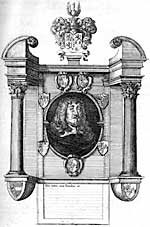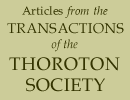
Monument to Sir Gervase Clifton (died 1666).
This boy lived through the stirring times of the great Civil War to a ripe old age, and became the most illustrious of all his family. The Earl of Shrewsbury, who took an interest in his education, described him when he was fifteen as possessing "a rare and excellent wit," and he used his influence to get him sent to St. John's College, Cambridge.1 In 1603 we get a glimpse of the young undergraduate thanking the earl with some Latin verses for the watch he had sent him.2 He was knighted that same year,3 and after studying for a time in the Inner Temple4 he settled down to the duties of his station serving as Sheriff of the county, 1610; as a Justice of the Peace; and as a deputy-Lieutenant.5 He represented the county in parliament in 1614, 1621, 1624, 1625, 1626 and the borough in 1628, and held various local offices of importance.6 In 1611 he was one of the first to acquire the newly introduced rank of Baronet. 7 The amiability of his character (which won for him the title his grandfather had borne of Gervase the Gentle), and his numerous marriages soon gave him a large and influential circle of friends. He had seven wives, and some of them linked him with the most powerful families in the kingdom. Among his familiar correspondents before the Civil War were the great Sir Thomas Wentworth (to whom he was brother-in-law), the Earls of Newcastle, Kingston and Exeter, Sir Harry Vane and the philosopher Thomas Hobbes.8 Gervase Holles, who knew him well, described him as " a gentleman every way worthy of his ancient extraction and deserving ancestors, having lived with as much lustre and love in his country as any in my time whosoever ; being of a nature (like his grandfather) most affable and courteous, of a disposition most noble, of good erudition and (throughout this long and damned rebellion) of a most unshaken and unsullied loyalty to his lawful Souveragne." His loyalty was an outstanding trait in his character, and the Earl of Exeter told him in 1630 that if only the king's servants possessed something of his "zealous pursute of His Majesty's sarvice "... "His Majesty's sarvis would be incrediblie advanced."9 When the Bishops' War broke out he promptly despatched troops to join the forces which Newcastle was collecting in the North, and at the opening of the Civil War, in response to a personal appeal from the king, he sent into Nottingham Castle for the use of the royalist forces a large collection of arms, armour and other military furniture.10 He also acted as one of Charles's commissioners of array for Lincolnshire.11 According to his own statement he was never actually in arms during the war but he attended the parliament summoned by the king at Oxford early in 1644,12 and was suspected by Colonel Hutchinson of being implicated in the seizing of Trent Bridge from the Parliamentarians in April, 1645.13 He was in Newark14 during the siege, 1645-6, and in June, 1646 compounded for his estates by a fine which was first fixed at £12,120, but was afterwards considerably reduced.15
For the rest of his life he seems to have lived quietly in retirement on his estates, his peace disturbed only by the conduct of his eldest son whom Thoroton describes as "the wretched unfortunate Sir Gervase, his father's greatest foyl." Of this family tragedy we have evidence in his own words. Writing to a friend in 1637, he said, " I would have you goe to my son and lette him know from me that till he carry himself more piously to God, more worthyly and soberly to his wife, more without scandall and intemperancy in his generall courses and leave of to wast and consume his estate as he doth . . . the world takes such notice of thes particulars as I have no great joy to see him at my howse and I may not be an Eli to connive at or sooth his obliquityes least I share in the guilt and punishment." Two years later he excused himself for not attending the Earl of Newcastle in person in the Scottish war as his wife " lyes att this present gaspinge and my sonne gapinge not for what I leave dyinge but what I have Hvinge my backe beinge turned to make a prey of all my convertible goodes within dores and without."16
After the Restoration he was again returned to parliament for the shire in 1661 and sat until his death in 1666, when he was succeeded in his estates by his second son, Sir Clifford Clifton.17 The eldest son, Gervase, was still alive and inherited the baronetcy, but he had forfeited his rights as heir by his conduct and was passed over, so far as lay in his father's power, in favour of his younger brother. He died without heirs in 167618 and the title then reverted to William, the son and heir of Sir Clifford Clifton, who had died in 1670.
(1) Hist. MSS. Comm., Salisbury Manuscripts,
XII, pp. 270, 302
(2) Hist. MSS. Comm., 6th Report, p. 450.
(3) Shaw, I, p. 154. July 25th, 1003.
(4) Members of the Inner Temple, 1547-1660, p. 176.
(5) Hist. MSS. Comm., Various Collections, VII, p. 395. He was a J.P., 1609-38
and 1660-66. Notts. County Records, p. 9.
(6) In 1010 he was Chief Steward of East Retford for life, an office formerly
held by the Earl of Shrewsbury.
(7) His estates, before the Civil War, were said to be worth £3,000 per annum—a
large sum in those days. Cal. S. P. Dom., 1636-6, p. 11.
(8) Some of his correspondence is printed in Hist. MSS. Comm., Various Collections,
VII.
(9) Hist. MSS. Comm., Various Collections, VII, p. 396.
(10) Ibid., pp. 422, 427. Transactions of the Thoroton Society, Vol. XV, pp.
172-3.
(11) Hist MSS. Comm., Buccleuch Manuscripts, I, p. 528.
(12) Rushworth, V, p. 576. He had been returned for E. Retford in 1640. (Piercy,
History of East Retford, p. 72).
(13) Hist. MSS. Comm., 6th Report, p. 80b.
(14) He was one of the king's commissioners
of array at Newark in
1644. Brown, C., History of Newark, II, p. 74.
(15) Calendar of the Committee
for compounding Part II, p. 1318.
(16) Hist. MSS. Comm., Various Collections,
VII, pp. 416, 422.
(17) He was the offspring of his father's second marriage, and had been knighted,
December 27th, 1661.
(18) He had been married to Sarah,
daughter of Timothy Pusey, of Selston, Notts.
